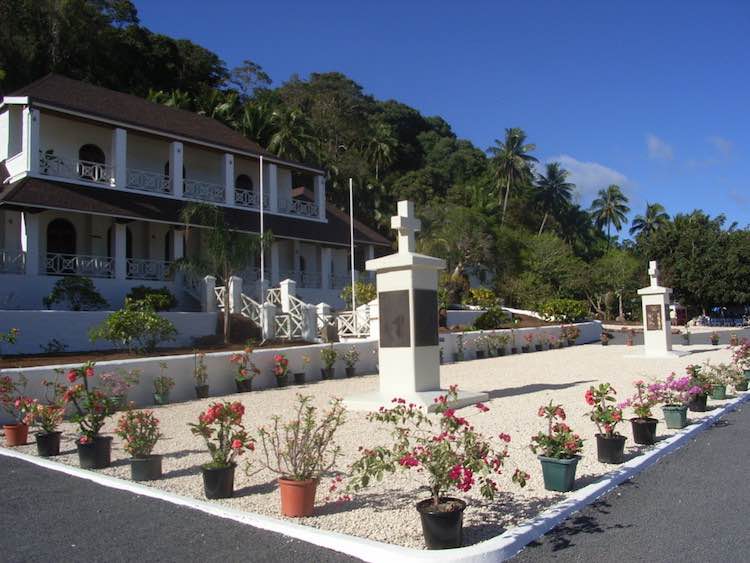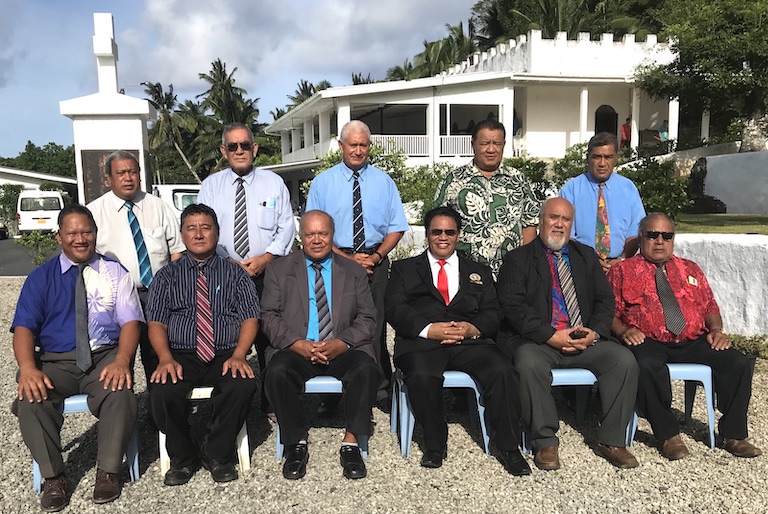THE GIRL GUIDES ASSOCIATION COOK ISLANDS
(GGACI)
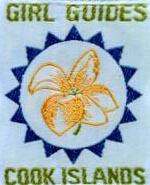
LOGO
The badge was developed and adopted in 1968 by a number of strong leaders under the supervision of Naomi Iro, who was an active trainer in those years.
Golden Yellow flower in the centre, a frangipani flower signifying our friendship to one another as Cook Islanders, and towards visitors at many occasions/functions/events or upon arrival by greeting them with fresh garlands to our shores. 15 Triangles represent the 15 beautiful islands in the Cook Islands, the navy blue colour represents the deep blue oceans connecting the islands. The light blue colour signifies the beautiful blue skies above us all. Every member is allowed to wear this on the left sleeve of their white blouse. In the same design as metal, this is worn on the leaders’ left side folded rito hat.
This year 2011, the badge was reviewed by many in aid of the Wales Girl Guiding who requested and sponsored the GGACI as part of their 100th Years of Changing Lives project to any elected Member Organization in how best they can support special projects. The negotiating period started in 2009 and was endorsed by the National Council at their 1st National Council Meeting in 2010 and confirmed the design or new logo by November 2010 after consultations with members in the GGACI and the sponsorship agent.
ADDRESS
Takamoa Administration Building, Avarua,Rarotonga, Cook Islands
The Girl Guides Association Cook Islands, P.O Box 670, Avarua, Rarotonga, Cook Islands
OFFICE BEARERS
2010-2012
Elected Positions
- National President – Tokerau Munro
- National Secretary – Mariake Pirake
- National Treasurer – Tepaeru Kokaua Hagai
- National Programme Co-ordinator – Haumata Hosking
- National Commissioner – Ngara Katuke National Trustees on Board – Matangaro Taripo, Nga Manea, Tokerau Munro
MEMBERSHIP
In 2009, membership totalled 611. There will be an update on membership this year. GGACI is a strong member in the Asia Pacific Region, who has a membership of 27 countries. There are 6 Pacific Countries in this Region – PNG, Fiji, Kiribati, Solomon, Tonga and Cook Islands. GGACI belongs to the World Association of Girl Guides & Girl Scouts, an organisation of more than 145 member organizations with an estimated 10 million girls.
HISTORY AND RECENT DEVELOPMENTS
Girl guiding in the Cook Islands is one of the oldest NGO groups in the Cook Islands. It was first established in Takamoa Grounds on the 26th October 1928. Mrs. Tailby introduced the organization to the church members of Avarua while her husband was a lecturer/missionary at the Cook Islands Christian Church Theological College.
In 1928, an application was forwarded to the Dominion Headquarters of the Girl Guides Association of New Zealand by Miss Ayson, daughter of Judge Ayson the Resident Administrator for the Cook Islands, asking for permission to start a Guide Company in Rarotonga. Permission was readily granted and the first Company was formed in Avarua and endorsed by Makea Nui Tinirau Ariki (1928-1940).
Despite isolation and difficulties, Guiding has flourished. It has had its high points and its low but throughout it all the movement has earned the respect and support of the community and Church and has helped in the training of many thousands of girls and women over many years.
In 1928, at the time of registration of the first companies, the Cook Islands Girl Guides Association (CIGGA) was formed and registered as a Province with the New Zealand Girl Guides Association. It remained a Province until early 1980 when it became known as a Branch Association of New Zealand.
In 1992, CIGGA became an associate member of the World Association of Girl Guides & Girls Scouts (WAGGGS) with the help of various Executive members from New Zealand and Australia and with the influence of the Asia Pacific Region Committee.
The elected Executive Committee, under the chairmanship of the first Island Commissioner, Mrs. Constance S. Bralsford, immediately began work and the various members undertook responsibility for the different aspects: – programme, age tests, training of Guiders, equipment and examination work.
At the same time an Advisory Council was formed. Judge Ayson was chairman, a position he held until 1937, but the only other known member was Makea Nui Tinirau Ariki who was a staunch supporter of Guiding until his passing away in 1940.
Since the economic crisis of the Cook Islands in 1996, CIGGA membership has decreased quickly due to families migrating to New Zealand and Australia. For almost 10 years we had experienced lots of difficulties gaining members for the simple reason that people were moving away and also new introduced sports in the islands.
We never gave up holding onto our Guiding movement with a strong spirit to continue. New ideas were introduced to keep the members and our girls continuing their interest in guiding, hence the Duke of Edinburgh Award was introduced and the AP Leadership Award. This was recognized at our 80th Anniversary Annual Camp in October 9th – 17th, 2008. Slowly our number is building up again and we hope to continue this to keep our numbers high and hopefully to become a full member into our WAGGGS by 2014.
CIGGA had a revamp with new positions being named and other positions being demolished due to the low number of members. The organization reviewed its constitution and by-laws, and new initiatives have been developed to suit young women these days. Financial assistance was sought with some funding coming through from the Governments of New Zealand and Germany.
The 100th years of changing lives began in 2010 for 3 years celebration globally. We celebrated differently in the Cook Islands with our sub- theme “ Celebration in Education.” This involved conducting a little birthday commemoration with a cake in selected Primary Schools on Rarotonga every 10th day of each month from January to December 2010.
This year 2011 we will provide once a month a community action service to a partnership NGO on the island to support the theme “Year of Volunteering.” Our sub-theme is called “100 Steps of Growing.”
ADMINISTRATION
The administration work for the organization is managed by the National Executive which consists of the President, Secretary, Programme Co-ordinator, Treasurer and the Commissioner. The President is the Chairperson of all National Council Meetings and National Executive Meetings. In her absence the Commissioner conducts the meeting. If both are absent the meeting has the right to elect an Executive person to conduct the meeting. All businesses need the endorsement of the National Council.
SECTIONS AND BRANCHES
- Pepe Auro (Golden Butterfly), 3-5 yrs
- Brownie Pack, 6-11 yrs
- Guide Company, 12-15 yrs
- Ranger Unit, 16-19 yrs
- Young leaders, 18 – 35 yrs
- Guiders, 20 yrs +
- Committees, 20 yrs +
- National Executive, 20 yrs +
Supporters are parents of the girls, or any interested person/s in the community or church.
MEETINGS AND OTHER EVENTS
The National Council holds 4 meetings annually as stated in our Constitution – on the 1st Thursday of each month in February, May, August and November. Our constitution was reviewed and registered with the Ministry of Justice on the 21st December 2009. The National Executive holds its monthly meetings in March, April, June, July, September, October on every 1st Thursday. All meetings are conducted in the Rev. John Williams Conference Room, CICC Head Office, Takamoa, Rarotonga. Representatives conduct their own meetings with members to look at the needs in each company on Rarotonga and in the outer islands.
Weekly meetings – it is compulsory for all guide units in the CICC to hold their weekly training program with their members every Monday except during public holidays. Meetings are run from February to November. The Catholic guide units sometimes follow the Monday schedule, or after their Sunday evening service for some.
National Events are as follows:
Opening Combined Church Parade, 2nd Sunday of February
World Thinking Day, February 22nd
ANZAC Day, April 25th
Constitution Day, August 4th
Cook Islands Day, October 15th
Closing Combined Church Parade, 2nd Sunday of November
Other events – Girls Brigade Week, Boys Brigade Week, Funeral Service, NGO Functions, State & Government Events or by invite
Note: national girl guide events are shared among the girl guide companies on Rarotonga to host with the approval of the National Council on their planned and organized program.
Regional Events:
Asia Pacific Region Conference are held every 3 years as elected by the AP for the next venue
Pacific Meeting annually since 2009 as elected by the members for the next venue
Training Workshops are held every 2 years as elected by the AP Committees
International Events:
Commissioners Conference is held every 3 years in conjunction with the World Conference to any elected Member Organization around the world.
REPRESENTATION
The guiding movement is a church-based organization which was first established in the Cook Islands Christian Church in Avarua and later branched to other Cook Islands Christian churches on Rarotonga and all the other islands. Guiding also introduced in the Catholic Parishes on Rarotonga and in the outer islands. All guiding units are administered by one National Council body. They also work together with their own churches, either CICC or Catholic.
In the CICC, the organization holds a combined church parade at the beginning and the ending of the year as stated above. However every other month, on the 2nd Sunday it is compulsory for each unit to hold its own church parade in their churches with other uniform organizations like the Boys Brigade and Girls Brigade. In the Catholic parishes, their church parade varies – some hold theirs on the 1st Sunday of each month whilst others have theirs on the last Sunday of each month, together with their brother Scouts.
The National Council has a Patroness, a position which automatically goes to the Queen’s Representative’s wife. This is an honorary position, and there are 4 other such positions:
- National Youth Director in the Cook Islands Christian Church
- National Youth Director in the Cook Islands Catholic Parish
- National Youth Director in the Ministry of Internal Affairs
- The Scout Association President
Appointed positions are as follows:
- Legal Adviser
- Auditor
Representatives from each of the outer islands:
- Aitutaki Island
- Atiu Island
- Mangaia Island
- Mauke Island
- Mitiaro Island
- Penrhyn Island
- Pukapuka Island
- Manihiki Island
- Rakahanga Island
- Palmerston Island
- Nassau Island
- Rarotonga Island, 2 delegates from each of the 7 Guide Companies
- Life Member – one or two members
- Young Leader – one or two members
- Observers – all guide leaders from all companies and other NGO representatives by invite
OBJECTS PROMISE LAW & MOTTO
-
To advance education by the special training and instruction of girls of the Cook Islands in the principles of discipline, loyalty, good citizenship and service for others and by the development of their character based on spiritual and moral values according to the principles embodied in the original Promise and Law as laid down by the Founder, Lord Baden-Powell of Gilwell, OM, GCMG, GCVO, KCB, namely:
-
To foster a love of country and promote a full sense of citizenship by developing an interest in home craft, health, social service, love of nature and the traditional arts and customs.
-
To encourage international goodwill and understanding by establishing friendly contacts with girls in other countries.
-
To extend the work of the Association among girls without distinction on the basis of religion, ethnicity or any other circumstance.
-
To respect the religious views of all.
-
To promote and develop Girl Guiding in the Cook Islands.
-
To keep the Association strictly non-political.
-
To promote young women in decision-making
PROMISE
I promise on my honour to do my best, to do my duty to God. To serve the Queen and my country and to help other people. To keep the Guides Law.
A Guide is loyal and can be trusted
A Guide is helpful
A Guide is polite and considerate
A Guide is friendly and a sister to all Guides
A Guide is kind to animals and respects all living things.
A Guide is obedient
A Guide has courage and is cheerful in all difficulties
A Guide makes good use of her time
A Guide takes care of her own possessions and those of other people
A Guide is self-controlled in all she thinks, says and does
MOTTO
Be prepared
FUNCTIONS OF THE NATIONAL COUNCIL
The control of the Association is vested in the National Council. The National Council may exercise all the powers vested in the Association, and may delegate such powers to the National Council or other Association body as it thinks fit, and shall exercise general supervision over the affairs of the Association.
The National Council shall:
- Determine and uphold the vision and mission of the Association.
- Articulate Guiding principles and values.
- Serve as an electoral body, holding elections for members of the National Council and National Nominations Committee.
- Confer life membership of the Association.
- Approve changes or amendments to the Constitution and the Promise and Law.
- Convey the views of the membership to the National Council so it can be informed when making policies and setting the strategic direction of the Association.
- Discuss issues affecting girls and young women.
- Ratify the appointment of all National positions, on the recommendation of the National Leaders Committee.
- As a policy influencing body, consider remits which company may put forward following discussion in their company. A remit which is endorsed by the National Leaders Committee will be referred to the National Council for consideration.
CONTACTS FOR THE NATIONAL COUNCIL EXECUTIVE MEMBERS
National Secretary – Mariake Pirake, Phone: 29357 (work),
Email: This email address is being protected from spambots. You need JavaScript enabled to view it.
Email: This email address is being protected from spambots. You need JavaScript enabled to view it.
Email: This email address is being protected from spambots. You need JavaScript enabled to view it.
Email: This email address is being protected from spambots. You need JavaScript enabled to view it.
ENROLMENT BADGE
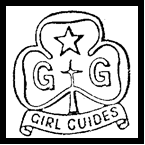
The Enrolment badge was first introduced by the New Zealand Girl Guides since the administering of the Cook Islands in the 1928 until today. This is still being used from the Guides Section to Rangers Section. The Brownies section has a different look which is the elf person in the centre of the trefoil. The Guides section has a golden colour. The Rangers section has a red colour coated in the centre. The Trainers, Leaders, Committees and Commissioners have different designs to their pins for their achievements.
All new members will receive this Enrolment Badge during a special planned and organized ceremony for the member(s). Today this Enrolment badge has been reviewed by the members and has been supported and sponsored by the Wales Girl Guiding as part of their project. Refer to last column below for details.
UNIFORM
OFFICIAL
- Pepe Auro (Golden Butterfly) - White dress with an Apricot apron
- Brownie Pack – brown Aline skirt, white short sleeve blouse, brown triangle scarf, rau ara hat with brownie white embroidery name on a brown head band
- Guide Company – navy blue skirt, white short sleeve blouse, navy blue triangle scarf, rito hat with girl guide white embroidery name on a navy blue head band
- Ranger Unit - navy blue skirt, white short sleeve blouse, red blue triangle scarf, rito hat with rangers red embroidery name on a navy blue head band
- Young leaders & Guiders - navy blue skirt, white short sleeve blouse, green cross bow tie, rito hat or white dress with the rito hat
- Committees & Supporters – white dress with rito hat
CAMP
Pepe Auro (Golden Butterfly) & Brownie Pack - – brown Aline skirt and Brownie T/shirt
Guide and others – navy blue skirt and girl guide T/shirt
TRAVELLING
Same as with camp above.
NEW LOGO
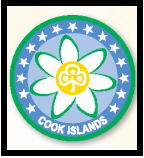
- The 15 stars represents the 15 islands in the Cook Islands
- The Trefoil leaves represent the 3 parts of the Promise – To God, the Queen & the people and the Guide Law. It is also reminding us the foundation principles of guiding the Promise, Law and the Motto
- The GG stands for the organization Girl Guides
- The Star in the centre reminds us to look onwards and upwards to the best things in life
- The Flower shape represents the national flower of the Cook Islands called Tiare Maori
- The 7 petals signifies the 6 days that God had created heaven and earth and on the 7th day had a rest called Sunday
- The golden colour represents the sun shining upon all members in the Cook Islands and it is also represents our Golden Butterfly and Brownies
- The light blue colour represents the skies uniting us all as guiding sisters in the Cook Islands and our sisterhood relationship with others around the world
- The green colour coated around the 7 petals and the outer circle represents the beautiful environment that God gave us all and the national colour for the Cook Islands represented by the Leaders wearing green ties
- The white colour stands for peace, the white uniform we wear and our duty to God
Message from the Principal
Kia Orana, Tangi ke rava, and Welcome to Takamoa Theological College. Praise be to God in the highest heaven, for allowing this time for us to have fellowship with you. It is also a time to celebrate the achievements of our forefathers as well as the missionaries who had offered their time and effort to convey the gospel of our Lord beyond their own horizons.
Takamoa Theological College is the second oldest institution in the Pacific region, which was established in the year 1839. This was due to the great dedication of the early missionaries to the Cook Islands namely, Aaron Buzacott and Charles Pittman of the London Missionary Society.
Ever since its establishment, Takamoa Theological College had offered the opportunity mainly for locals to pursue theological studies in its various academic and professional programmes. Local parish ministers on the island of Rarotonga deliver most of these programmes. A great many pastors, church leaders as well as evangelists had been accomplished and had fulfilled many mighty things for their Master.
More than a thousand pastors, church leaders as well as evangelists had been produced at Takamoa, and they were sent throughout the Pacific Region to evangelize to those who were lost in heathenism. Today, after many years of its existence, Takamoa Theological College continues to educate future church leaders. The contents and quality of the education while remaining basically Christian has been reappraised and revamped to suit the needs of the people in any age where the Gospel message is being challenged.
Takamoa Theological College is determined to live up to the challenges and to ensure that the Christian basis of the communities of the Cook Islands people is not destroyed or eroded.
The students units were originally built mainly of lime from coral stones. But today there is a new facelift of the student’s units as, the lime structures were replaced by modern styled houses to suit today’s purposes. Even though there were oppositions from concerned citizens, the new development still went ahead.
The studies of theological disciplines such as, Theology, Ethics, Biblical Studies, Church History, Christian Education and Ministry continue to be pursued at Takamoa Theological College. This hope is for ministers, to enable them to exercise leadership both in the church and community.
If in the end you decide to come to Takamoa, be assured of the welcoming nature of the lush greenish backdrop, the rustling of the morning breeze and the exciting possibilities that await you upon your arrival. May God in the abundance of grace, surround you always.
Rev. Tere Marsters, Principal
College Vision: “To Know Christ, and to Make Him Known”
Purpose Statement
Takamoa Theological College provides a community under the Lordship of Jesus Christ in which the students can discover their identity, spiritual gifts and resources in Christ. These goals are accomplished through the study of the Word of God, discipline and practical training. In this atmosphere, we are committed to seeing our students develop a burden of world evangelization, church planting and ministry skills for fulfilling the commands of His Sovereignty. In summary the Purpose Statement of Takamoa Theological College shall be:
“To be Commanded and Commissioned with a Commitment”
(Matthew 22:37 – 40, Matthew 28:19, 20, Romans 12:1)
Doctrinal Statement
-
We believe in the Scriptures of the Old and New Testament, as verbally inspired by God, infallible and inerrant in the original writings, and that they are of supreme and final authority in faith and life.
-
We believe in one God externally existing in three persons; Father, Son and Holy Spirit.
-
We believe that Jesus was conceived by the Holy Spirit and born of the Virgin Mary and He is therefore true God and true Man.
-
We believe that man was created in the image of God, that he sinned and thereby incurred not only physical death but also spiritual death which is a separation from God; and that all human beings are born with a sinful nature and in the case of those who reach oral responsibility become sinners in through word and deed.
-
We believe that the Lord Jesus Christ died for our sins according to the scriptures as a representative and substitution sacrifice and that all who believe in Him are justified on the basis that His shed blood has atoned for the believers' sin.
-
We believe in the resurrection of the crucified body of our Lord, in His ascension into heaven and in His present life there for us as High Priest and Advocate.
-
We believe in “that blessed hope” the personal imminent return of our Lord and Saviour Jesus Christ and the rapture of the church.
-
We believe that all who receive by faith, the Lord Jesus Christ are born again of the Holy Spirit and thereby become children of God.
-
We believe in the bodily resurrection of the just and unjust, the blessedness of the saved and the everlasting punishment of the lost.
The Faculty
The faculty of Takamoa Theological College takes its stand upon the Holy Scriptures as the Inspired, Inerrant and Infallible Word of God. They are mostly parish ministers from the local churches on the island of Rarotonga. We also have committed members of the faculty from the community at large, retired, as well as business people, who offer their time and knowledge to teach at the College. Visiting lecturers from the Pacific Region and abroad do visit us at the Takamoa Theological College.
Faculty Members
Rev. Vakaroto Ngaro Dip. Th, B.Th, B.C.E. M.A. - College Principal
Educational Background: - Dip. Th. Takamoa Theological College, B. Th. Fiji College of Theology and Evangelism, M.A.,
B.C.E. Evangels Christian University of America, PhD Candidate Olivet University.
Pastoral Experience: Missionary Teacher to the Republic of the Marshall Islands, Parish Minister at Matavera CICC,
Ngatangiia CICC and elected as Principal of the Theological College 2001.
Lecturer in Old & New Testament Studies, Christian Education, Music Theory, Homiletics, Prophecy, Apologetics, Pentateuch.
Lecturers Academic Subject Record
The lecturer, working from his/her own subject/course materials determines the most appropriate means of assessing those students who are his/her responsibility. These means may vary according to the subject and might include written papers to be submitted during the course, or other practical exercise. Examination completed at regular times or other specifically nominated times may be used. These might be in the form of end-of-term or end-of-semester exams or both. They can also be in the form of progressive assessments through the period of the course offered. The lecturer may also feel that assessment of a student contribution in class discussion would be appropriate and therefore might include this as another means of assessment. Project material might also be appropriate. In some subjects the students may be required to express such project work in the form of a presentation involving him and/or beyond the subject classes. These might take the form of lessons, messages, sermons or a series of such presentation – perhaps in churches, schools or the community. Students should be told the nature and times of assessment early in their courses.
Record Academic Programme Options
Certificate in Biblical Studies, Diploma of Theology.
This is a four (4) year programme. A student must complete a four-year study and also to give a satisfactory Christian Service in the local church and demonstrate a Christ-like character before he/she will be recommended for the diploma.
There is also the hope to raise the academic programme to a Bachelor of Arts level.
Academic Policies
Students are required to fulfill the specified academic level of the courses, from the first year to the fourth year. For students on special cases, they are required to participate in the activities of the class to which they are admitted.
Grading System: The following grading system will be used in the classes and will determine the grade point ratio of the student.
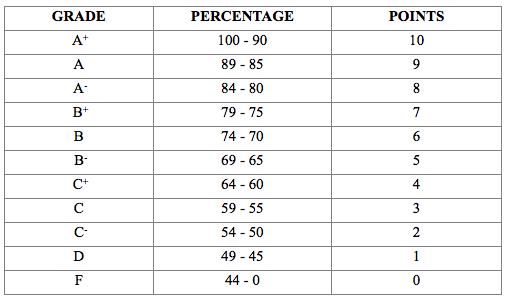

NOTE: This Grading System has been adopted from the PTC Grading System.
(PTC 2003 HANDBOOK – Page 28)
Admission Policy
Since the objective of Takamoa Theological College is to train men and women for Pastoral Ministry, this is required of each student:
-
Each prospective student should exhibit an earnest desire to serve Christ and be able to present acceptable evidence, which is genuine to his calling.
-
The applicant should be required to submit three references. One of which must be from the minister of his local church.
-
Candidates should be humble, co-operative and willing to submit to the rules and regulations of the College.
-
The college reserves the right to refuse admission or readmission to any or prospective student.
-
Those who apply to enter Takamoa Theological College should be in agreement with the Cook Islands Christian Church doctrinal statement and agree in writing to abide by the rules and regulations.
-
The general academic entrance in Takamoa is the New Zealand School Certificate, its equivalent.
-
The candidate should be required to submit evidence of his claim.
Admission Procedures
-
Each applicant for admission to the college must submit to the Principal the following documents:
-
Application for admission - This is a form concerning general information, academic background, financial needs and personal data.
-
A copy of all educational certificates evidencing the candidate’s academic achievements. This would include school certificates, Diplomas or Degree issued by educational bodies.
-
Each applicant is expected to include a passport sized photograph with his application form.
-
Once, all the forms have been received and evaluated, the applicants may be called for an interview before he is notified of his acceptation or rejection.
Application
Those who wish to apply to study at Takamoa Theological College may discuss with their Pastors in his/her own respective Parish, and also upon the recommendation of that Parish. The applicant must also be an active member in the church in various roles within the church like Sunday School Teachers, Deacons, and Youth Leaders but not necessarily recent converts.
He must spend at least two or more years of service in the church and also working alongside the Pastor. He must spend some long hours of study with his/her Pastor to accumulate some understanding of Takamoa Theological College.
College Fees
In the past, the College doesn’t charge any fees to whoever applies, but those days are gone. We are now in the business world where money is also needed to assist in the programmes of the College. The Fees are as follows:
-
Application Fees - $50.00. This fee is non-refundable, and it will be used in the paperwork.
-
Entry Fees - $800.00. This fee will be used for the running of the school, administration and other needs required. The Theological Training at Takamoa is Four Years, and $700.00 is merely not enough to run the school. This amount may be raised in the future.
-
Textbook Fees - $200.00. This fee will be used to purchase books for the students according to the various subject areas as each Lecturer requires. So far the students were purchasing their own textbooks, plus help from families and Christian friends around the globe.
Registration
The final date of registration to the programme is the last week of January. Orientation week begins in the first week of February where textbooks are to be purchased during this week by the students. This will be a week of familiarization of the students to the College, the Faculty as well as the Executive Committee. General instructions will be given to them and also the College Rules and Regulations. Each student is urged to abide by those rules and regulations. They must also understand that their first year at College is a Probationary Year. If their performance for that year is not up to the standard required, then that student shall be sent back to his own church.
College Curriculum of 4 Years
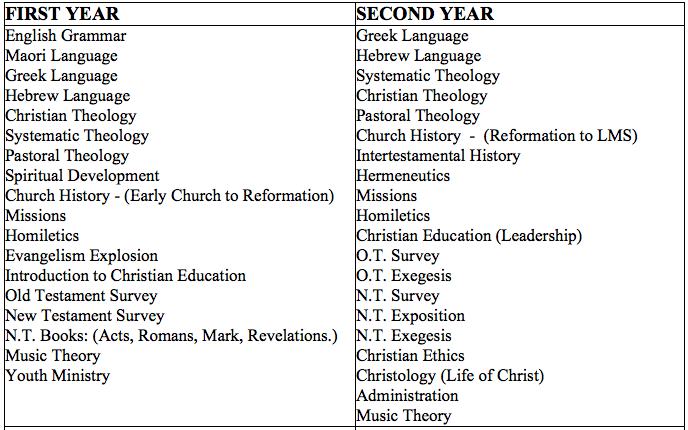
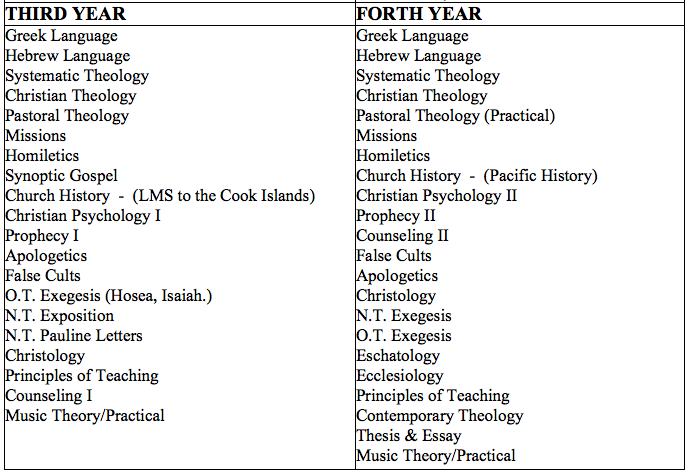
Description of the Courses
LANGUAGE:
English I:
This course is mostly basic, and this presents the fundamentals of English grammar. The Parts of Speech are studied in detail and not forgetting sentence structure.
English II:
This is a Foundational Course which can be offered through the USP by Extension.
N.T. Greek I and II:
A course in the element of Koine Greek. Intensive study is done in necessary basic principle of grammar, paradigms, vocabulary word order and practice translations with a view to exegetical study in the Greek New Testament.
N.T. Greek III and IV:
An advance course in Koine Greek. Special emphasis is given to Greek syntax and basic principles of exegesis. The students’ vocabulary is enlarged by study of irregular verbs and translation of Gospel and an Epistle.
O.T. Hebrew I:
This is an introductory course for students who wish to gain a basic understanding of the Hebrew Language. It assumes no previous knowledge. At the end of the course the student should be able to read aloud, look up words in the Hebrew-English Lexicon, and translate simple passages. Text Book: A Practical Grammar for Classical Hebrew (2nd edition) by J. Weingreen
O.T. Hebrew II:
It is a continuation of the study with much emphasis on the grammar, vocabulary, development of sentence of structure. This course will also introduce the methods and tools of exegesis using the Hebrew Text.
CHURCH HISTORY:
History I:
This is a study of the Early Church. The course covers the period from the end of the Book of Acts to the development of the church up to AD 450
History II:
This course covers the history of the Reformation in Europe and also the Catholic Reformation, sometime called the Counter Reformation. The leaders of these reformations will be profiled. It will also cover the expansion throughout Asia.
History III:
This course is a Survey of the Political, Social, Economic and Cultural History of the world, the history of civilizations up to 1648 to the present.
History IV:
This course covers the birth of the London Missionary Society, Australia and the Pacific, much emphasis will be placed on Pacific Church History. It will cover the extension of the Gospel to Tahiti.
History V:
This course covers the period of the extension in Tahiti and the arrival of Christianity to the Cook Islands. The extension to the outer islands, and also throughout the Pacific, Papua New Guinea, Samoa, New Caledonia, New Hebrides etc.
THEOLOGY:
Theology I: Introduction
This is an introductory into the course.
Theology II: Bibliology
This course offers a study of the doctrine of inspiration and its problems including the subjects of origin and preservation of the Scriptures, manuscripts, versions, canonicity etc.
Theology III: Theology and Christology
This course offers the study of God, His existence and attributes. His work in predestination, preservation, and providence. The study of Christ, His Pre-Existence, Deity, Incarnation, Humanity, Death, and Atonement.
Theology IV: Pneumatology and Anthropology
This course offers a study of the Holy Spirit, His Personality and Deity, is undertaken with particular attention to His Indwelling, baptizing, filling and spiritual gift ministries in the believer. The study of man includes his origin, nature and fall.
Theology V: Hamartiology and Soteriology
This course offers a study of sin, its permission, origin, nature, imputed sin, personal sins, and consequences. Sin’s remedy is found in salvation, which is studied under its description – grace, election, sanctification, redemption, propitiation, reconciliation, justification, security, repentance and faith.
Theology VI: Ecclesiology and Angeology
And exegetical and theological study of the church – its origin organism as the Body of Christ, organization, ordinances, and work. The framework of Biblical dispensation is examined in view of the church. The study of angels includes their nature and ministry with examination of Satan, fallen angels and demons.
Theology VII: Eschatology
The study of prophetic revelation in the plan and purpose of God. Intensive study is given to the biblical covenants, the kingdom programme, the second coming, rapture of the church, tribulation, millennium, death, resurrection and eternal destinies.
NEW TESTAMENT:
New Testament I: N.T. Survey
This is a Survey of all books in the New Testament. Special attention will be given to the major themes and general content of each book. This will provide the necessary foundation upon which all upper level New Testament courses are built.
New Testament II: The Synoptic Gospels
A synthetic and analytical study of the Gospel accounts of the first three evangelists. Each gospel is studied according to its distinctive viewpoint.
New Testament III: The Gospel of John
A verse by verse study of the Gospel, stressing not only the life of our Lord, but those particular elements of his teaching which are emphasized by John. A practical application of this gospel to daily Christian living and to the needs of the personal worker is developed.
New Testament IV: The Pauline Epistles
A textual analysis of the Epistles of 1 & 2 Thessalonians, Galatians, 1Corinthians, and Colossians. Special attention is paid to the historical and structural development of Paul’s arguments with applications to present day needs.
The Christian’s position in Christ and practice on earth is further studied by an analysis of the Epistles of 2Corinthians, Romans, Ephesians, 1&2 Timothy, Philippians, Titus and Philemon. Stress is placed upon the argument of each epistle. Special projects are assigned for some of these epistles.
New Testament V: Hebrews and the General Epistles
A textual analysis of Hebrews through Jude after an examination of the historical background and authorship of each book. Careful attention is given to the development of each writer’s argument and the emphasis on Christian maturity in James and Hebrews.
New Testament: The Revelation
The argument and content of the Apocalypse are studied intensively, together with an examination of the schools if interpretation, with regard to the millennium and the tribulation period. A detailed study of the text of the Apocalypse demonstrates the validity of the pre-tribulation rapture and the pre-millennial positions.
OLD TESTAMENT:
Old Testament I: O.T. Survey
A survey of all the books in the Old Testament. Attention will be given to development of the theme in each book as well as to the mastery of the general content of each.
Old Testament II: Pentateuch
This course offers a study of the Old Testament legal Books, (Genesis – Deuteronomy). Special attention will be given to the exegetical study of Genesis 1 – 11, and to explaining the flows of the Patriarchal and National History in Genesis 12 to Deuteronomy 34. Contemporary approaches to the Pentateuch will be evaluated.
Old Testament III: Historical Books
A study of the Old Testament historical books, (Joshua – Esther). Special attention will be given to Israel’s national history from the conquest to the Post-exilic return. Issues in OT chronology and archeology will be evaluated.
Old Testament IV: Poetical Books
A study of the Old Testament, Poetical books (Job – Isaiah). Special attention will be given to Israel’s national poetic literature (Job – Psalms) and wisdom books (Proverbs – Ecclesiastes). Lamentations, Songs of Solomon, and Isaiah are also examined. The nature and phenomena of Hebrew poetry will be discussed.
Old Testament V: Prophetic Books
This course offers a study of the Old Testament Prophetic Books, (Jeremiah – Daniel). Special attention will be given to Israel’s major prophets (Jeremiah – Daniel) and minor prophets, (Hosea – Malachi). Some consideration will be given to prophetic eschatology and to the use of Old Testament prophecy in the New Testament.
PASTORAL THEOLOGY:
Pastoral Theology I: Apologetics
This course is designated to generate confidence concerning the Christian Faith through a rational defense and response to the anti-Christian objections. Attention is given to a variety of Christian evidence which support the claims of Christianity. This course covers four areas of study: Fundamental, Historical, Philosophical, and Pragmatic Apologetics.
Pastoral Theology II: Practical Ministry
This course mainly deals with the life and service of the minister with much consideration. Particular emphasis is placed on Biblical Studies, Services, Ordinances, Weddings, Funerals, Visitations, Counseling and Related Matters.
Pastoral Theology III: Homiletics
This course offers a study of the nature and development of the sermon. Practice is given in preparation and writing expository sermons, with greater attention to the delivery and refinement of sermon development.
Pastoral Theology IV: Principles of Church Growth
Every pastor knew the difficulties and problems in this area. This course offers to help student development skills from being theoretical to practical. Special emphasis is placed on communicative skills, personality, temperaments, initiative etc.
Pastoral Theology V: Discipleship
This is an inductive study of Biblical and particular Gospel Discipleship with an emphasis in the relationship between discipleship and evangelism. Primary issues include s biblical rationale for discipleship, the role of teaching in discipleship, the place of learning and obedience, the costs, values, behaviour, and biblical principles of discipleship training and evaluation.
BIBLE INTERPRETATION:
Bible I: Introduction
This course is designed to acquaint the student with how our Bible came to us. This course also covers the major areas of inspiration, canonicity, authenticity and genuineness. Definitions and false theories of inspiration are examined along with the full scope of verbal plenary inspiration. The various texts and manuscripts are studied to show how we received our modern Hebrew, Greek and English versions and translations.
Bible II: Geography
This course will follow the Historical geography or other texts. Students will be given the opportunity to thoroughly acquaint himself/herself to the Biblical lands and its people.
Bible III: Hermeneutics
This course emphasizes the theory and practice of interpretation using the literal, grammatical, historical, cultural, contextual principles, and method. Axioms and rules of interpretation are presented and practice provided in their application to the text. Attention is given to features of Biblical literature, such as figures of speech, poetry, prophecy and typology.
Bible IV: Bible Study Methods
In this course, the student will study eight different methods of Bible Study.
EVANGELISM I - VII:
Evangelism I: Crusade Evangelism.
Evangelism I: Crusade Evangelism.
Evangelism II: Personal Evangelism.
Evangelism III: Pastoral Evangelism.
Evangelism IV: Open Air Evangelism
Evangelism V: History of Evangelism
Evangelism VI: History of Evangelism
Evangelism VII: Evangelism Explosion
Evangelism VIII: Church Planting
Instructions are given in how to get a new church planted, including, starting a children’s church and youth ministry with a goal of being fully supported independent or a denominational church.
COUNSELING
Counseling I:
This course introduces the student to the theory of counseling and helps the student make an indicative study of the specific biblical principles of counseling. The primary emphasis is on the Christian counselor’s relationship with his counselee. Listening communication techniques, and skills are covered.
Counseling II:
This course is designed to further develop listening and communication skills with emphasis on practical application. Guidelines for referral will be developed.
Time Frame of Studies at TTC
Students are expected to complete the programme, which is normally four years. All students that apply at Takamoa are mainly married couples and they are all Fulltime students. Student wives are also encouraged to study together with their husbands. Single students are not allowed due to some experiences that the College went through in the past. They are expected to perform with the highest respect as required in the College.
Awarding of Diplomas and Certificates
We at Takamoa Theological College is offering the Cook Islands Diploma of Theology as well as the Certificate in Biblical Studies. The Diplomas and Certificates that are offered at Takamoa are only recognized in the Cook Islands Christian Church. There is also the hope of getting an Accreditation from the SPATS for a recognition of our Diploma throughout the Pacific Region and also abroad, but our Library had to be improved. Recently, the Fiji Bible College in Lautoka, helped us in various ways as well as offering their Diploma of Theology and Certificate in Biblical Studies to the students of Takamoa. This is also a giant leap for the college in her academic ability.
The Executive Committee or General Assembly awards the Diploma of Theology, to those students who had accomplished the requirements due to that Diploma and had been fully approved upon the recommendation of the Principal. The students’ wives will also be awarded the said Diploma if they fully complete the Academic Programme.
The Certificate in Biblical Studies will be awarded to those who do not complete the full academic programme.
There is also the hope to offer the degree of Bachelor of Arts in Biblical Studies, with the help from the Fiji College of Theology and Evangelism.
College Library
This is a very important asset for any school/college. There had been a lot of reshuffling and relocation of the College Library, and books also went missing in the process. There is a need to purchase more books for our Library to cater the needs of our students. We have over a thousand books in our Library, and it is not enough for the students research work. For the Diploma Programme, the Library must accumulate at least 5,000 books. The students are currently purchasing their own books, and whatever is left, will be put in the Library for future reference.
End Note
We do hope you enjoy your stay at the Campus
Note: The commiitte is in the process of finalising so this section will be updated in due course
Responsibilities
The CICC Head Office Administration is located in the Mission House at Takamoa. Its day-to-day operations are managed by the General Secretary, Administration Officer, Director of Publications, and an office assistant. They are accountable to the CICC Executive Council which itself is accountable to the CICC General Assembly.
The office is responsible for the following key tasks:
- Implementation of administration-related resolutions passed by both the General Assembly and the Executive Council
- Management of CICC finances
- Management of the Tepuka property
- Secretariat to the Executive Council
- Organisation and management of the CICC assemblies
- General office administration
Office hours are 9.00am – 3.00pm, Monday to Friday, closed during public holidays.
Contacts for more information
Nga Mataio
CICC General Secretary
Office Phone: 26547, Mobile: 78421
Email: This email address is being protected from spambots. You need JavaScript enabled to view it. (wk) or This email address is being protected from spambots. You need JavaScript enabled to view it. (hm)
Nga Mitiau-Manavaikai
Administration Officer
Phone: 26546
Email: This email address is being protected from spambots. You need JavaScript enabled to view it.
Mauri Toa
Director of Publication
Phone: 26546
Email: This email address is being protected from spambots. You need JavaScript enabled to view it.
Members
The Executive Council is a 11-member body elected every 4 years by the CICC General Assembly, to oversee the implementation of its resolutions and the general management of the church from its headquarters in Takamoa. The current council composition is as follows:
- Rev. Tuaine Ngametua – President
- Junior Ngatokorua – Legal Adviser
- Tangi Tereapii – Treasurer
- Tinirau Soatini – Representative, Committee of Ministers
- Rev. Vaka Ngaro – Representative, Rarotonga CICC Council
- Rev. Panu Rouru – Representative, Southern Group Islands
- Makirere Poila – Representative, Northern Group Islands
- Rev. Tere Marsters – Principal, Takamoa Theological College
- Rev. Oirua Rasmussen – Representative, NZ branches
- Mona Ioane - Representative, Australia branches
- Nga Mataio – General Secretary
Meetings
The council meets on average twice a month to discuss and make decisions on prevailing issues to do with the welfare and development of the church. The council also oversees the church’s partnership arrangements with the Uniting Church of Australia, Presbyterian Church of NZ, Congregational Union of NZ, Pacific Conference of Churches, Cook Islands Fellowship of Melbourne, and the Maohi Protestant Church of French Polynesia. Office holders in the CICC branches are most welcome to make presentations in the council meetings. Arrangements can be made with the General Secretary.
Church Visitation
The Executive Council has a visitation programme to the church branches within the Cook Islands, New Zealand and Australia. The programme includes meetings with members of the branch, and workshops covering areas of need. Given the number of church branches (60) and their distribution as above, branches can be visited approximately every 5 years.
Powers of the Executive Council
The council members’ powers as stipulated in the CICC constitution are valid when the assembly is not in session. When the assembly is convened for its normal week-long session every 2 years, the decision making process reverts back to the assembly. The council takes over again on behalf of the assembly the day after the assembly closes.
Contact for More information
The contact details of the individual council members are contained in the “Contact Addresses of CICC Ministers and Officials,” version 2018. This can be found elsewhere on this website. Otherwise, queries can be directed to the General Secretary as below:
Email: This email address is being protected from spambots. You need JavaScript enabled to view it. (wk) or This email address is being protected from spambots. You need JavaScript enabled to view it. (hm)
General Inquiries
General enquiries – General Secretary on This email address is being protected from spambots. You need JavaScript enabled to view it. or phone 26547.
Enquiries on the individual church branches – please use the document “Contact Addresses of CICC Ministers and Officials” which can be found elsewhere on this website.
Enquiries on the church departments (youth, publications, social welfare, evangelism) – as above

















